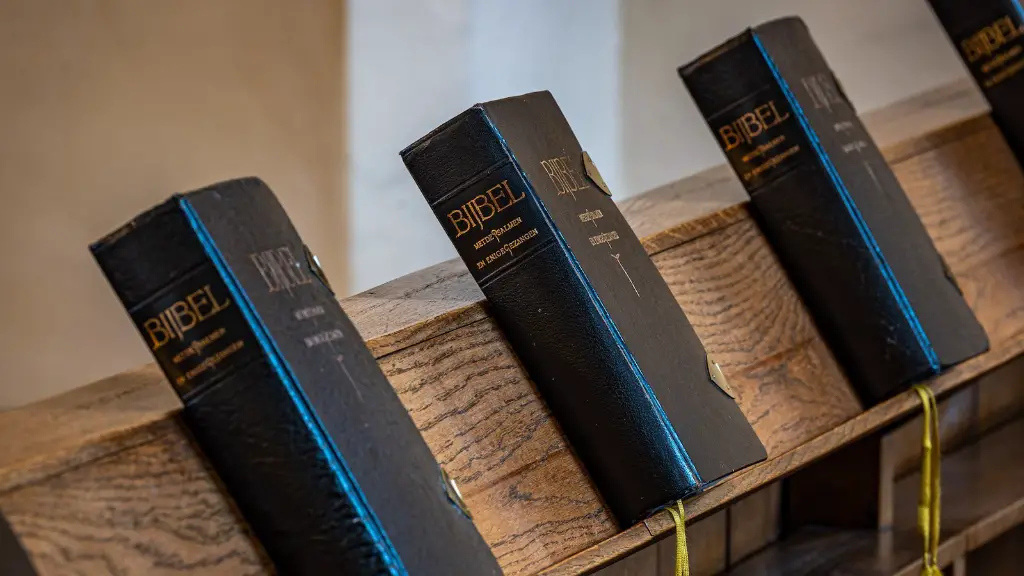Christianity is based on faith in God as revealed in the Bible. To grow in our relationship with God, we need to read the Bible and learn from it. The Bible is not just a book of rules or a list of things to do or not do. It is the story of God’s love for us and how we can respond to that love. It shows us who God is and how we can know him. It also tells us about the beginning of the world, the nature of human beings, and God’s plan for salvation.
The Bible can be read in many different ways, but perhaps the best way to approach it is to first pray and ask God to guide you as you read. Then, start with one of the Gospels (the books of Matthew, Mark, Luke, or John) and read it through from beginning to end. As you read, take note of the main characters and events, and ask yourself what they can teach you about God and His love for us. If you have any questions, don’t hesitate to ask your pastor or a trusted friend for help in understanding what you’ve read.
What is the correct way to read the Bible?
There is no right or wrong order to read the Bible. It is a personal choice. You can read it in any order you like, depending on what you are looking for.
When you first start reading the Bible, it’s important to read small portions at a time. Don’t try to read an entire book in one sitting – you’ll just get overwhelmed. Instead, read for 10-15 minutes each day, and savor each word and phrase. You’ll gradually get a better understanding of what the Bible is all about, and you’ll be able to apply its teachings to your own life.
How to read Bible in order
This is a great way to get started with Bible study! You can begin by following a simple historical narrative, starting with Genesis and reading in order. This will give you a good foundation for understanding the Bible as a whole. After that, you can move on to study specific books or topics that interest you.
In the history of biblical interpretation, four major types of hermeneutics have emerged: the literal, moral, allegorical, and anagogical. Each of these four types of hermeneutics has its own strengths and weaknesses, and each has been used to interpret the Bible in different ways.
The literal hermeneutic is the most straightforward way of interpreting the Bible. It takes the text at face value and tries to understand it in its literal meaning. This approach has the advantage of being easy to understand and of being able to provide a clear and consistent interpretation of the Bible. However, it has the disadvantage of being too simplistic and of not being able to take into account the complex symbolism and imagery of the Bible.
The moral hermeneutic is more concerned with the ethical and moral implications of the Bible. It tries to understand how the Bible can be applied to our lives in order to make us better people. This approach has the advantage of being more relevant to our lives and of providing guidance on how to live according to the Bible. However, it has the disadvantage of being too prescriptive and of not taking into account the historical and cultural context of the Bible.
The allegorical hermeneutic is more
What should I read first in the Bible?
Genesis is the first book of the Bible, and as such, it lays the foundation for the rest of the story. In it, we learn about God, His creation, and His plan for humanity. If we understand these things, the rest of the Bible will make a lot more sense.
These are all expressions of gratitude for the gift of the Bible. The Bible is a unique book that contains the Word of God. It is a source of guidance and wisdom for Christians.
What is the simplest way to study the Bible?
Bible study is a necessary part of a Christian’s life. It allows us to grow in our understanding of God’s Word and apply it to our lives. But, like anything else, learning how to study the Bible effectively can take some time and practice.
Here are seven steps that will help you study the Bible more effectively:
1. Read through the chapter carefully.
2. Seek to find its main subject or subjects.
3. Give each chapter a title that suggests its main content.
4. Reread the chapter and make a simple outline.
5. Take note of any practical or theological problems in this chapter.
6. Compare what you have read with other passages on the same subject.
7. Prayerfully ask God to help you understand and apply His Word.
Bible reading is a great way to learn about God and grow in your relationship with him. But it can be hard to keep up with your reading if you’re doing it alone. That’s why reading the Bible in community is so important. It’s one of the quickest ways to get out of a reading rut.
But that doesn’t mean you should never read the Bible alone. In fact, spending some time each day meditating on the Bible is a great way to deepen your understanding of it. And when you respond to the Bible in prayer, you’ll be amazed at how much closer you feel to God.
What are the five ways to read the Bible
There are five primary ways to approach the Bible: hearing, reading, studying, memorizing, and meditating. Each of these methods has unique benefits and can help deepen your understanding and connection to God’s Word. Try utilizing all five approachs in your personal Bible engagement to form a well-rounded, life-changing experience.
Building up a habit of reading the Bible can be a great way to grow closer to God. Here are seven practical tips to help you get started:
1. Pray for a hunger for God’s Word. Ask God to give you a desire to read His Word and to understand it.
2. Set a definite time. Choose a time of day that you can consistently set aside for reading the Bible.
3. Read consecutively. Once you start reading, don’t skip around. Try to read through the Bible in order.
4. Turn your heart to the Lord. As you read, keep your heart and mind focused on God. Pray over what you read.
5. Keep track of your Bible reading. A simple journal can be a great way to keep track of your progress and what God is teaching you through His Word.
6. Guard against distractions. It can be easy to get sidetracked when reading the Bible. Try to find a quiet place where you can focus on your reading.
By following these tips, you can develop a habit of daily Bible reading that will help you grow in your relationship with God.
How do you read and fully understand the Bible?
The Bible can be a daunting book to approach, but don’t let that stop you from reading it! These tips should help remove some of the mystery around reading the Bible and encourage you to read it more often. Remember to pray before you start reading, and to read more than just a few verses at a time. Using a study Bible can also be helpful, as you can read commentary alongside the text. Finally, Reading the Bible in community with others can be a great way to gain different perspectives and deepen your understanding.
The Holy Bible: Easy-to-Read Version (ERV) is an English translation of the Bible that is easy to read and understand. It was originally published as the English Version for the Deaf (EVD) by BakerBooks. The ERV is perfect for people who are looking for a Bible that they can read and understand without difficulty.
What prayer do you say before reading the Bible
Thank you, Father, for anointing me with your Holy Spirit. As I read your eternal word, may your word penetrate my whole being and transform me. Grant me the blessing to be a faithful disciple in believing the Word of God and that I may be a light shining upon all who are in darkness. Amen.
Great work, Steve!
Is it important to read the Bible in order?
Reading the Bible chronologically can help us understand God’s plan for history and how He has worked to redeem mankind. This can give us a deeper appreciation for how our lives fit into His plan.
If you’re new to Bible study, it can be tough to know where to begin. In my opinion, it’s best to start in the middle, with the story of Jesus. Oftentimes, I will suggest people begin with the book of John.
Warp Up
There is no one answer to this question as everyone reads and interprets the Bible differently. Some people read it regularly as part of their devotional life, while others may only read it occasionally. Some people read it literally, while others interpret it more symbolically. Ultimately, there is no right or wrong way to read the Bible, as long as it is done with an open heart and mind.
There is no one answer to this question, as people can read the Bible in different ways for different reasons. Some people may read it for religious reasons, while others may read it for historical or literary purposes. Whatever the reason, reading the Bible can be a rewarding experience.





